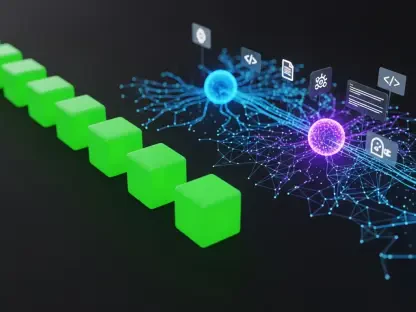The evolution of software development has reached an exciting new paradigm in 2025, known as vibe coding. This innovative approach shifts coding from a manual process to a more accessible, natural language-based interaction. Developers now describe their coding goals, and AI performs the bulk of the work, from code generation and debugging to refactoring. This shift has made software development more accessible to those without deep technical knowledge while also boosting the productivity of seasoned developers.
Cutting-Edge AI Code Editors for Linux
Zed: Speed and Customizability
The first notable AI-powered code editor is Zed, celebrated for its outstanding performance. Written in Rust, Zed is designed to minimize latency and optimize both CPU and GPU resources, ensuring a fast and efficient coding experience. This optimization is particularly beneficial for developers working on large projects or those requiring substantial computational power, as it allows for seamless and uninterrupted workflow.
Zed stands out with its Assistant Panel and inline assistants, which make refactoring, generating, and editing code intuitive through natural language commands. This feature simplifies the coding process, allowing developers to focus on higher-level problem-solving rather than syntax and code structure. Additionally, Zed’s open API allows developers to integrate various AI models, including Claude 3.5 and local models via Ollama. This flexibility ensures that developers can tailor the AI capabilities to their specific needs, enhancing the overall utility of the editor.
Flexpilot IDE: Open Source Excellence
Flexpilot IDE offers another robust solution, distinguishing itself with its open-source nature and foundation in the VS Code ecosystem. This open-source approach ensures high customizability and provides developers with control over both the AI models they use and their data privacy. With a community-driven development model, Flexpilot benefits from continual improvements and diverse contributions, making it a dynamic and evolving tool.
Flexpilot IDE excels in delivering context-aware autocompletion and the ability to edit multiple files simultaneously with AI assistance. These features significantly enhance productivity by reducing the time spent searching for references or manually completing repetitive code patterns. Moreover, the integration of AI directly into the terminal further augments productivity, allowing for command-line operations to benefit from intelligent suggestions and automated processes. By offering token tracking and compatibility with GitHub Copilot along with other VS Code extensions, Flexpilot provides a comprehensive and adaptable coding environment suitable for a wide range of development tasks.
Familiar Ground with Extra Power
VS Code with GitHub Copilot
VS Code integrating GitHub Copilot remains a well-known and widely utilized option, embedding AI assistance within an already extremely popular editor. Copilot distinguishes itself by providing real-time code suggestions tailored specifically to the context of the project at hand, thereby reducing the cognitive load on developers and streamlining the coding process. This integration covers multiple programming languages including Python, JavaScript, and Go, which enhances its versatility and broad appeal across different coding communities and use cases.
This functionality is especially valuable for new developers and those working on open-source projects, as GitHub Copilot is offered free for students and open-source initiatives. However, it should be noted that the AI functionalities heavily rely on cloud services, which might present challenges related to privacy and data security for some users. Despite these concerns, the integration with GitHub and the rich feature set of VS Code make this a powerful tool in the modern developer’s arsenal.
Pear AI: Development in Progress
Pear AI, another intriguing entry derived from a VS Code fork, aims to pioneer AI-first development. Despite being still in development and occasionally experiencing performance hitches, Pear AI shows significant promise with its forward-thinking approach. The editor allows integration with local AI models and private servers, offering greater flexibility and control over the user’s data and AI interactions. This distinguishing feature is particularly beneficial for organizations with stringent data privacy requirements or those seeking to leverage proprietary AI models.
Pear AI’s context-aware chat and inline code suggestions are some of its key features, making real-time interaction with the code seamless and efficient. The capability to generate helpful suggestions based on the code’s context can expedite the development process and reduce errors. As Pear AI continues to evolve, its potential to become a mainstay in AI-assisted coding environments looks promising, suggesting that developers should keep an eye on its progress.
Feature-Rich and Versatile Options
Fleet by JetBrains: A Heritage of Excellence
Fleet by JetBrains brings with it a legacy of excellence from renowned IDEs like IntelliJ IDEA and PyCharm. Fleet is crafted to offer a minimal yet intelligent interface designed for maximum usability and speed. Developers can expect a quick startup and real-time collaboration features, making it an ideal choice for team-based projects and remote work environments.
Fleet supports a broad range of programming languages including Java, Kotlin, JavaScript, TypeScript, Python, Go, and more, catering to diverse development needs. Besides the core coding functionalities, it integrates essential tools like Git management, Docker and Kubernetes support, and Markdown editing. Additionally, customizable themes and keymaps enable developers to personalize the environment to match their preferences and workflow, increasing comfort and efficiency during development sessions.
Cursor: Deep Integration and Support
Cursor offers a heavily modified VS Code experience with an emphasis on deep AI integration, creating a robust coding environment that leverages the power of artificial intelligence to its fullest. This editor supports multi-file editing and inline chat, providing developers with tools to interact with their code and colleagues in real time directly from within the editor. The natural language terminal commands extend the AI’s capabilities into command-line operations, making terminal interaction more intuitive and efficient.
Cursor’s AI-powered code generation and context-aware assistance enhance productivity by predicting and automating repetitive tasks, enabling developers to focus on more complex problem-solving aspects of their projects. The extensive support for code autocompletion and markdown further extends its utility, making Cursor a versatile tool suitable for a variety of development scenarios.
Windsurf: Advanced Autonomous Features
Windsurf, previously known as Codeium, represents a significant advancement in AI-powered coding with its focus on autonomous capabilities. This innovative code editor can write and refine code iteratively based on output assessments, effectively functioning as a proactive coding assistant. This agentic capability means developers can rely on Windsurf to handle routine coding tasks and refine code continuously, enabling them to focus on higher-level design and architectural decisions.
Windsurf’s introduction of Supercomplete and Cascade features further enhances its ability to understand complex workspaces and generate intelligent code suggestions in real time. These features significantly reduce the cognitive load on developers, allowing them to maintain a clear focus on solving challenging problems. Supporting models like GPT-4, Claude 3.5, and LLaMA 3.1, Windsurf demonstrates a high degree of compatibility and flexibility, making it an essential tool for modern software development.
Shaping the Future of Coding
In 2025, the field of software development has undergone a significant transformation with the advent of vibe coding. This revolutionary method has moved coding away from traditional manual processes toward interactions based on natural language. Now, developers articulate their desired outcomes, and AI systems handle the majority of the tasks, including generating code, debugging it, and refactoring it as needed.
This paradigm shift has made software development much more accessible, even to those who do not possess extensive technical expertise. Individuals who may have previously found coding intimidating can now contribute effectively, thanks to the user-friendly nature of vibe coding. At the same time, experienced developers benefit from enhanced productivity since they can delegate routine tasks to AI and focus on more complex, creative aspects of their projects.
Vibe coding empowers a broader audience to participate in software development, breaking down barriers and democratizing the field. The integration of AI tools not only accelerates the coding process but also minimizes human error, leading to higher quality software and more efficient development cycles. Essentially, vibe coding has created a more inclusive and productive environment for both novice and expert developers, signaling a profound change in how software is conceived and created.









